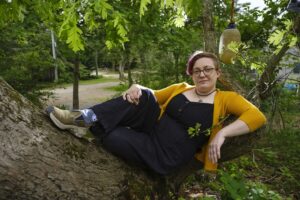PROVINCETOWN — As legal protections for transgender people are stripped away at the federal level, the effects are being felt far beyond Washington. That is true even here in Provincetown and neighboring towns that pride themselves on acceptance and on their depth of experience in and knowledge about queer history.
An executive order signed by the new president in January directed the Dept. of Health and Human Services to investigate youth gender dysphoria treatment. The resulting 400-page report, released on May 1, questioned the legitimacy of gender-affirming care and cast doubt on the validity of trans identities altogether.
Transgender residents of the Outer Cape say these kinds of orders and the resulting policy proposals feel like personal attacks as well as a call to action.
“When Donald Trump became president again, I had clarity and focus that I didn’t expect,” said James, a local trans activist who asked to be identified only by first name because of worries about his safety. “He is trying to take away everything that lets me exist as a human being on this Earth.”
“My only choice,” he said, “is to fight him.”
Some dimensions of the fight for trans rights are local, though. And they’re not all easily won, even in predominantly progressive Provincetown, James said, describing the constant work of explaining his existence and involvement in creating a more inclusive infrastructure.
At this spring’s town meeting, Provincetown passed Article 20, which expanded gender-inclusive access to public restrooms. James said the effort required months of pressure. “The town has not gone along willingly,” he said. “It has taken a lot of work on our part to get them to believe this is a real issue.”
Implementation of the measure will still take time. Bringing facilities into compliance with state standards for gender-inclusive design requires planning and funding. “You hang Trans Pride flags as if you believe that I belong here, and yet I can’t use a bathroom in my own town,” James said. “It feels like asking for a hall pass.”
The Hall Pass Project is now James’s effort to illuminate the everyday barriers faced by trans residents and to call for a broader coalition of support. “I’m a person who is being discriminated against,” he said. “It’s not really my job to fix that discrimination. It’s the job of the community.”
Sam Sewell, who lives in Provincetown and identifies as “gender playful,” believes the town’s reputation doesn’t always match reality. “If people are coming to town because we’re marketing ourselves as ‘Everybody’s welcome,’ then we should walk the walk,” Sewell said.

An area where Sewell says people need to come together more is one that transcends questions of gender identity. Sewell is working to create alternatives to Provincetown’s alcohol-heavy nightlife. To that end, they’ve organized sober-inclusive events like pool hangs and earlier dance parties. “There are a lot of people in recovery in the sapphic community, in the trans community, and just in general,” Sewell said.
Sewell also wants to see more outreach and opportunities for nonbinary people in the town’s cultural institutions. “I’d like to see some of the bigger entities in town reaching outside of their programming comfort zones, like really taking a leap,” they said.
In Eastham, nonbinary artist and educator Robin Huibregtse is pushing for structural change. In March, they petitioned the select board to designate Eastham a gender-diverse sanctuary town. “The designation would make you feel like you can rest your shoulders a little bit and know that your town has your back,” Huibregtse said.

Progress on the designation has since stalled. And though Huibregtse said the Outer Cape feels safer than much of the rest of the country, that safety isn’t guaranteed. “There are people even here,” they said, who would like nonbinary people to “go back into the shadows and be quiet. I refuse to do that.
“I wish the violence that happens to trans and gender-diverse people was more in the forefront of public attention here,” Huibregtse continued. “It can often feel ignored, like few are fighting back against it.”
Huibregtse said that meaningful progress could start with something as simple as a human rights committee or LGBTQ youth group modeled after We Thrive, a center in Hyannis where youth gatherings are meant to be peer-led and free from judgment. “Young people through this model learn about each other and realize that people are really not very different at all,” the nonprofit’s website says.
“Those are small steps that would have a big impact,” Huibregtse said.
Some progress is already underway, especially among elder residents. Eastham’s Senior Center launched a monthly LGBTQ group for queer elders last year, following a local needs assessment. It includes members from Eastham and neighboring towns.
“We’d love to do more things that are multigenerational,” said Joan Lockhart, a COA board member and co-liaison to the group. “We’re hoping that the Lower Cape Pride activities happening the weekend of June 13 to 15 will help bridge some of those connections.”
Lockhart said some group members expressed fear after the presidential transition. “They were asking, should we take down our Pride flags? Should we remove the stickers from our cars?” she said. “But I don’t think any of them have.”
For Kristen Becker, founder of the Summer of Sass program in Provincetown, visibility is more than symbolic. It’s a form of protection. The program brings LGBTQ young adults from less-accepting parts of the country to live and work in Provincetown for the summer, offering jobs, housing, and community.
“There’s a real attempt to dilute queer joy right now,” said Becker. “We want to make it as concentrated as possible.”
This year, to avoid issues with Real ID and passport scrutiny at airports, Becker’s team arranged travel for participants by bus and train from Indiana, Oklahoma, Maryland, and rural California. One trans applicant from Florida dropped out after his family decided it was time to leave the U.S. and move to Canada.
As for the effect of the federal administration’s positions on the people she wants to help, Becker is glad to be rooted on the Outer Cape.
“The more distant the federal government gets from anything I’ve ever been able to recognize, the less I care to rely on it,” said Becker. “I want to stay as community-driven as possible.”
That was a view shared by all those in a gender-diverse group that spoke with this reporter: local action is important. There were corollaries: every petition and every gathering is a refusal to go quietly; pride is more than a season.
“There’s a real feeling of community and of change that can happen here,” Sewell said.
